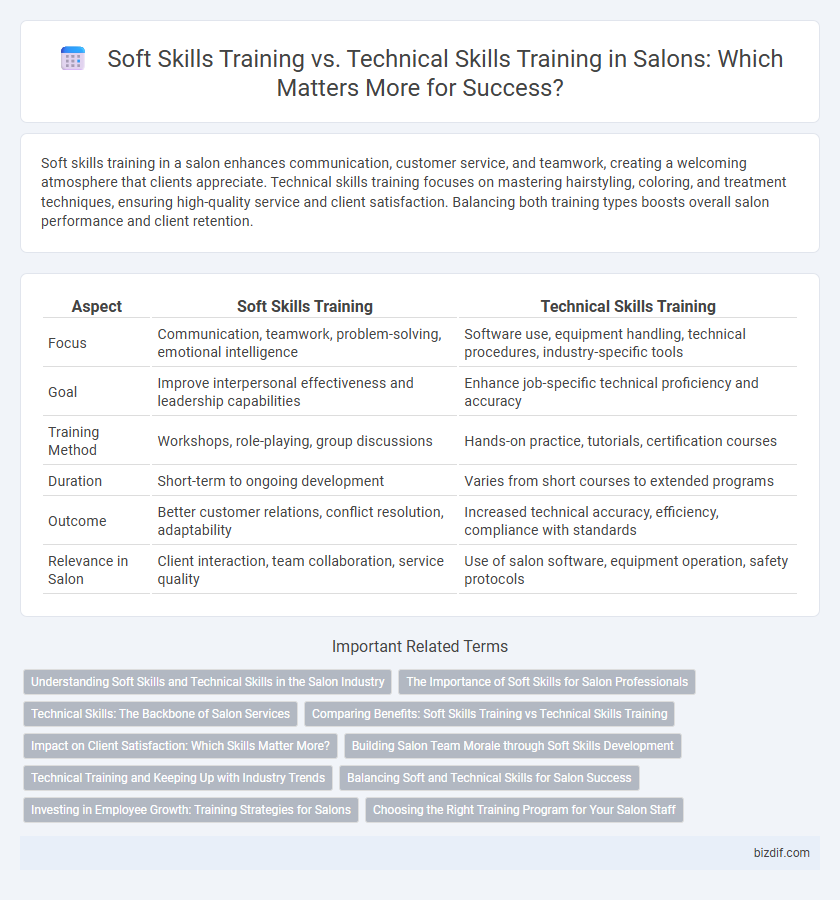Soft skills training in a salon enhances communication, customer service, and teamwork, creating a welcoming atmosphere that clients appreciate. Technical skills training focuses on mastering hairstyling, coloring, and treatment techniques, ensuring high-quality service and client satisfaction. Balancing both training types boosts overall salon performance and client retention.
Table of Comparison
| Aspect | Soft Skills Training | Technical Skills Training |
|---|---|---|
| Focus | Communication, teamwork, problem-solving, emotional intelligence | Software use, equipment handling, technical procedures, industry-specific tools |
| Goal | Improve interpersonal effectiveness and leadership capabilities | Enhance job-specific technical proficiency and accuracy |
| Training Method | Workshops, role-playing, group discussions | Hands-on practice, tutorials, certification courses |
| Duration | Short-term to ongoing development | Varies from short courses to extended programs |
| Outcome | Better customer relations, conflict resolution, adaptability | Increased technical accuracy, efficiency, compliance with standards |
| Relevance in Salon | Client interaction, team collaboration, service quality | Use of salon software, equipment operation, safety protocols |
Understanding Soft Skills and Technical Skills in the Salon Industry
Soft skills in the salon industry encompass communication, empathy, client consultation, and teamwork, which are essential for building client trust and enhancing customer experience. Technical skills training focuses on mastering hair cutting, coloring, styling techniques, and the use of salon tools and products, ensuring service precision and quality. Balancing both skill sets enables salon professionals to deliver exceptional service while fostering strong client relationships and driving salon success.
The Importance of Soft Skills for Salon Professionals
Soft skills such as communication, empathy, and customer service are essential for salon professionals to build strong client relationships and enhance client satisfaction. Unlike technical skills, soft skills improve team collaboration and create a welcoming salon environment, which drives customer loyalty and repeat business. Investing in soft skills training leads to improved conflict resolution and adaptability, key factors for success in the fast-paced beauty industry.
Technical Skills: The Backbone of Salon Services
Technical skills training in salons focuses on mastering hair cutting, coloring, and styling techniques essential for delivering high-quality services. Precise knowledge of product formulations, tools, and sanitation protocols ensures clients' safety and satisfaction. Investing in technical expertise enhances a salon's reputation, client retention, and overall business growth.
Comparing Benefits: Soft Skills Training vs Technical Skills Training
Soft skills training in salons enhances client communication, conflict resolution, and teamwork, leading to improved customer satisfaction and retention. Technical skills training focuses on mastering hair cutting, coloring, and styling techniques, ensuring high-quality and innovative service delivery. Combining both training types optimizes overall salon performance by blending expert craftsmanship with exceptional client experiences.
Impact on Client Satisfaction: Which Skills Matter More?
Soft skills training, such as communication, empathy, and active listening, significantly enhances client satisfaction by creating a welcoming and personalized salon experience. Technical skills training ensures precision and quality in services like haircuts and coloring, which directly affects the client's perception of professional expertise. Balancing both skill sets is crucial; however, salons emphasizing soft skills often see higher client retention and positive reviews due to stronger emotional connections.
Building Salon Team Morale through Soft Skills Development
Soft skills training in salons enhances communication, teamwork, and customer service, directly boosting team morale and creating a positive work environment. While technical skills training improves proficiency in hair styling, coloring, and treatments, soft skills foster emotional intelligence and conflict resolution among staff. Investing in soft skills development leads to higher staff retention, increased client satisfaction, and a more cohesive salon team.
Technical Training and Keeping Up with Industry Trends
Technical skills training in salons enhances proficiency in advanced techniques such as hair coloring, cutting, and skincare, ensuring stylists deliver high-quality services. Keeping up with industry trends through continuous education on new tools, products, and styles is crucial for maintaining competitive advantage and client satisfaction. Investing in technical training helps salons adapt quickly to innovations like organic treatments and digital booking systems, driving business growth.
Balancing Soft and Technical Skills for Salon Success
Balancing soft skills training, such as communication, empathy, and customer service, with technical skills training in haircutting, coloring, and styling is essential for salon success. Enhancing interpersonal abilities improves client satisfaction and retention, while mastering technical expertise ensures high-quality service delivery. Integrating both skill sets cultivates a well-rounded stylist capable of adapting to diverse client needs and elevating salon reputation.
Investing in Employee Growth: Training Strategies for Salons
Investing in employee growth through soft skills training enhances client interaction, boosting customer satisfaction and loyalty in salons. Technical skills training ensures stylists stay updated on the latest hair cutting, coloring, and treatment techniques, maintaining high service quality. Balancing both training types maximizes salon team performance and drives business success.
Choosing the Right Training Program for Your Salon Staff
Selecting the right training program for your salon staff involves balancing soft skills training, such as communication and customer service, with technical skills training, including advanced haircutting and color techniques. Prioritizing programs that enhance client interaction and technical proficiency ensures a well-rounded team capable of delivering exceptional service and building lasting client relationships. Investing in personalized training plans based on individual staff strengths and salon goals maximizes productivity and client satisfaction.
Soft Skills Training vs Technical Skills Training Infographic

 bizdif.com
bizdif.com